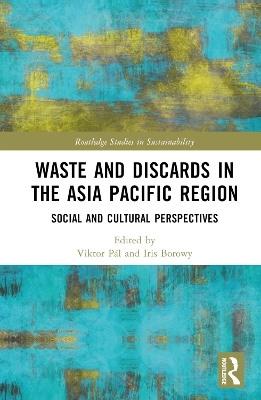
Waste and Discards in the Asia Pacific Region
Routledge (Verlag)
978-1-032-36614-2 (ISBN)
This book uncovers, explores and analyses the cultural and social factors and values that lie behind waste making, recycling and disposal in the Asia Pacific region, where impressive economic growth has led to significant increases in production, consumption and concomitant waste production.
This volume demonstrates the immense scope of waste as a multi-sectoral phenomenon, covering discussions on food, menstrual products, sewage, electronics, scrap, nuclear waste, plastics and even entire villages as they are submerged underwater by dam building, considered expendable in favour of economic growth. It discusses the wide range of approaches and contexts through which people interact with waste, including socio-economic analysis, participatory observation, laboratory science, art, video, installations, literature and photography. Case studies focusing on India, China and Japan, in addition to other regional examples, demonstrate the ubiquity of waste, materially and geographically. They reveal the multiple, sometimes contradictory, dimensions of waste: managing it can foster community building but can also exclude marginalized groups; waste can trigger innovative economic concepts and practices, but it can also pollute the oceans in large garbage gyres and it can wondrously change its nature from trash to useful components to new production, before being discarded once again.
This timely and wide-ranging collection of essays will be an important read for scholars, researchers and students in sustainability, development studies, discard studies, and social and cultural history, particularly focusing on countries in the Asia Pacific.
Viktor Pál is a Hungarian environmental historian, an Associate Professor at the University of Tampere, Finland, and the University of Ostrava, Czechia, and a visiting researcher at the University of Helsinki. He is the author of the book Technology and the Environment in State-Socialist Hungary: An Economic History (2017), and with Stephen Brain, he has co-edited the collection of essays, Environmentalism under Authoritarian Regimes. Myth, Propaganda, Reality (2019). Iris Borowy is a Distinguished Professor at Shanghai University, China. She is also a founding director of the Center for the History of Global Development at that university. Her publications include Defining Sustainable Development for Our Common Future: A History of the World Commission on Environment and Development (Brundtland Commission), published in 2014.
1. Introduction: Contemporary Cultural Perspectives on Discards in the Asia-Pacific Region 2. Caste, Hierarchy and Cultural Construction of Food (Waste?) 3. Environment by, with, and for the Citizens: Collective Identity Shaping the Community-Driven Solid Waste Management in Kerala, India 4. Polluted Histories, Clean Futures? Differing Scenarios for an Electronic Waste Circular Economy in China 5. What Type of Trash are You? Steering "Green" Citizenship and Self-Responsibility in Urban China 6. Becoming Visible: An Examination of Chen Qiulin’s Farewell Poem (2002) and Jia Zhangke’s Still Life (2006) 7. Individually and Collectively Grieving the Fukushima Dead at a Waste-Mountain: A Reading of Post-3/11 Novel ‘Hikari no Yama [Mountain of Light]’ by Japanese Monk-Writer Genyu Sokyu 8. Defining Food (and its Waste) 9. Waste Through Different Eyes: Multi-Sited Photovoice Explorations 10. Afterword: Planetary Potlatch: Scrutinizing the Moral Economy of Recycling
| Erscheinungsdatum | 11.07.2023 |
|---|---|
| Reihe/Serie | Routledge Studies in Sustainability |
| Zusatzinfo | 3 Tables, black and white; 9 Line drawings, black and white; 30 Halftones, black and white; 39 Illustrations, black and white |
| Verlagsort | London |
| Sprache | englisch |
| Maße | 156 x 234 mm |
| Gewicht | 420 g |
| Themenwelt | Naturwissenschaften ► Biologie ► Ökologie / Naturschutz |
| Naturwissenschaften ► Geowissenschaften ► Geografie / Kartografie | |
| Sozialwissenschaften ► Soziologie ► Spezielle Soziologien | |
| ISBN-10 | 1-032-36614-1 / 1032366141 |
| ISBN-13 | 978-1-032-36614-2 / 9781032366142 |
| Zustand | Neuware |
| Informationen gemäß Produktsicherheitsverordnung (GPSR) | |
| Haben Sie eine Frage zum Produkt? |
aus dem Bereich


